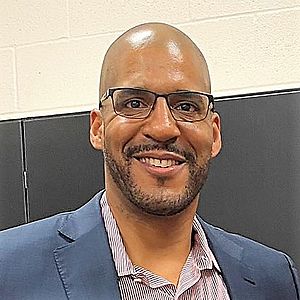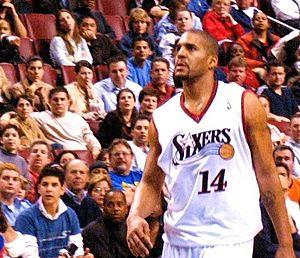Corliss Williamson facts for kids

Williamson in 2021
|
||||||||||||||
| San Antonio Spurs | ||||||||||||||
|---|---|---|---|---|---|---|---|---|---|---|---|---|---|---|
| Assistant coach | ||||||||||||||
| Personal information | ||||||||||||||
| Born | December 4, 1973 Russellville, Arkansas, U.S. |
|||||||||||||
| High school | Russellville (Russellville, Arkansas) | |||||||||||||
| Listed height | 6 ft 7 in (2.01 m) | |||||||||||||
| Listed weight | 245 lb (111 kg) | |||||||||||||
| Career information | ||||||||||||||
| College | Arkansas (1992–1995) | |||||||||||||
| NBA Draft | 1995 / Round: 1 / Pick: 13th overall | |||||||||||||
| Selected by the Sacramento Kings | ||||||||||||||
| Pro career | 1995–2007 | |||||||||||||
| Coaching career | 2007–present | |||||||||||||
| League | NBA | |||||||||||||
| Career history | ||||||||||||||
| As player: | ||||||||||||||
| 1995–2000 | Sacramento Kings | |||||||||||||
| 2000–2001 | Toronto Raptors | |||||||||||||
| 2001–2004 | Detroit Pistons | |||||||||||||
| 2004–2005 | Philadelphia 76ers | |||||||||||||
| 2005–2007 | Sacramento Kings | |||||||||||||
| As coach: | ||||||||||||||
| 2007–2009 | Arkansas Baptist (assistant) | |||||||||||||
| 2009–2010 | Arkansas Baptist | |||||||||||||
| 2010–2013 | Central Arkansas | |||||||||||||
| 2013–2016 | Sacramento Kings (assistant) | |||||||||||||
| 2016–2018 | Orlando Magic (assistant) | |||||||||||||
| 2018–2019 | Phoenix Suns (assistant) | |||||||||||||
| 2023–present | Minnesota Timberwolves (assistant) | |||||||||||||
| Career highlights and awards | ||||||||||||||
|
||||||||||||||
| Career NBA statistics | ||||||||||||||
| Points | 9,147 (11.1 ppg) | |||||||||||||
| Rebounds | 3,183 (3.9 rpg) | |||||||||||||
| Assists | 972 (1.2 apg) | |||||||||||||
|
Medals
|
||||||||||||||
Corliss Mondari Williamson, born on December 4, 1973, is a well-known American basketball coach. He currently works as an assistant coach for the Minnesota Timberwolves in the NBA. Before becoming a coach, he was a professional basketball player. He played for four different teams during his 12-year career.
Corliss is often called "Big Nasty". He got this nickname from his AAU coach when he was just 13 years old. In college, he was a very strong power forward for the Arkansas Razorbacks. When he joined the NBA, he was a bit smaller for a power forward, so he mostly played as a small forward.
Contents
Corliss Williamson's Early Career
Corliss Williamson had an amazing journey in basketball, starting from his high school days. He showed great talent and leadership from a young age.
High School Basketball Achievements
Corliss Williamson played basketball at Russellville High School in Arkansas. He was a star player there, earning many awards. He was chosen as an all-conference and all-state player three times. In 1992, he was even named the Gatorade National Player of the Year.
Before his senior year, Corliss played in an AAU championship game. He faced off against future NBA star Chris Webber. Corliss scored 37 points, while Webber scored 38, showing how talented Corliss was. In his senior year, he averaged 28 points and 9 rebounds per game. He led his team to win the King Cotton Classic championship. In the final game, Russellville beat a team led by Jason Kidd. Corliss blocked Kidd's shot right at the end to win the game! He was named the tournament's Most Valuable Player (MVP). However, he gave his medal to his teammate, Marcus Thompson, showing his team spirit. Corliss finished his high school career by playing in the 1992 McDonald's All-American Game. He scored 14 points and grabbed 10 rebounds in that game. His #34 jersey has been retired by Russellville High School. It hangs in their arena, along with his McDonald's All-American jersey.
College Basketball Success
Corliss Williamson played college basketball for the University of Arkansas from 1992 to 1995. In his first year (1992–93), he helped Arkansas achieve a 22–9 record. They reached the "Sweet 16" in the NCAA Tournament. They lost to the North Carolina Tar Heels, who went on to win the national championship. Corliss averaged 14.6 points and 5.1 rebounds per game. He was named to the SEC All-Freshman Team.
In the 1993–94 season, Corliss was named the Most Outstanding Player of the NCAA Tournament. He led the Razorbacks to a fantastic 31–3 record and their only championship under coach Nolan Richardson. They beat the Duke Blue Devils 76–72 in the championship game. Corliss also led his team to the championship game in 1995, but they lost to UCLA.
During his three seasons at Arkansas, Corliss was a First Team All-SEC player in 1993, 1994, and 1995. He was also named the SEC Player of the Year in both 1994 and 1995. He was a Second Team All-American in both of those years too. Besides the 1994 NCAA National Championship, Corliss helped the Razorbacks win the SEC West Division title all three seasons. They also won the SEC regular season championship in 1994. Corliss finished his college career with 1,728 points. This ranks him 8th all-time in the school's history. In 2009, Corliss Williamson was inducted into the Arkansas Sports Hall of Fame. His jersey (#34) is one of only two jerseys retired by the University of Arkansas. He is considered one of the top five players in the school's history.
Corliss Williamson's NBA Career
After his junior year in college, Corliss Williamson decided to enter the NBA draft. The Sacramento Kings chose him as the 13th overall pick in the first round of the 1995 NBA draft.
Playing for the Kings and Pistons
His best year as a player was during the 1997–98 season. He played 79 games for the Kings and averaged 17.7 points per game. He finished second for the NBA Most Improved Player Award that year. Before the 2000–01 season, Sacramento traded him to the Toronto Raptors. He played 42 games for the Raptors before being traded again to the Detroit Pistons.
In the 2001–02 season, Corliss was named the NBA's Sixth Man of the Year. This award goes to the best player who usually comes off the bench. He later became a key member of the Pistons' team that won the NBA Championship in the 2003–04 season. Even though he often started games on the bench, Corliss played a very important role in the Pistons' offense. His coaches often relied on him to score when the team needed a basket. He was a tough player to guard because he was too strong for smaller players and too fast for bigger players.
After winning the championship, the Pistons traded Corliss to the Philadelphia 76ers in August 2004. Then, in February 2005, he was traded back to the Sacramento Kings.
Corliss Williamson is one of the few basketball players who have won championships at three different levels:
- AAU (Amateur Athletic Union)
- NCAA (National Collegiate Athletic Association) with Arkansas
- NBA (National Basketball Association) with Detroit
Coaching Career Highlights
Corliss Williamson retired from playing basketball in September 2007. He then started his coaching career as an assistant coach at Arkansas Baptist College. He worked there as a volunteer coach for three years. In his last season at the school, he became the head coach.
On March 12, 2010, Corliss was announced as the head men's basketball coach at the University of Central Arkansas. He promised to bring an exciting style of play, similar to his former college coach, Nolan Richardson. His teams improved each season, but they never won more than half of their games.
On August 2, 2013, Corliss left Central Arkansas to become an assistant coach for the Sacramento Kings.
On June 29, 2016, the Orlando Magic hired Corliss as an assistant coach. He had previously worked with Frank Vogel, who was an assistant coach when Corliss played for the 76ers. However, when Frank Vogel was fired in 2018, Corliss was also let go.
On June 27, 2018, Corliss Williamson was hired by the Phoenix Suns as an assistant coach. He had a connection with the Suns' head coach, Igor Kokoškov, who was an assistant coach for the Detroit Pistons during their 2003–04 championship season when Corliss played there. However, when Kokoškov was fired after his only season as head coach for the Suns, Corliss and the rest of the coaching staff were also fired.
As of July 2023, Corliss Williamson joined the Minnesota Timberwolves as an assistant coach.
NBA Career Statistics Summary
Corliss Williamson played in the NBA for 12 seasons. Here's a quick look at his career averages:
- Points per game: 11.1
- Rebounds per game: 3.9
- Assists per game: 1.2
He played a total of 822 regular season games. In the playoffs, where teams compete for the championship, he played 66 games. His playoff average was 7.5 points per game.
See also
 In Spanish: Corliss Williamson para niños
In Spanish: Corliss Williamson para niños
 | Valerie Thomas |
 | Frederick McKinley Jones |
 | George Edward Alcorn Jr. |
 | Thomas Mensah |


